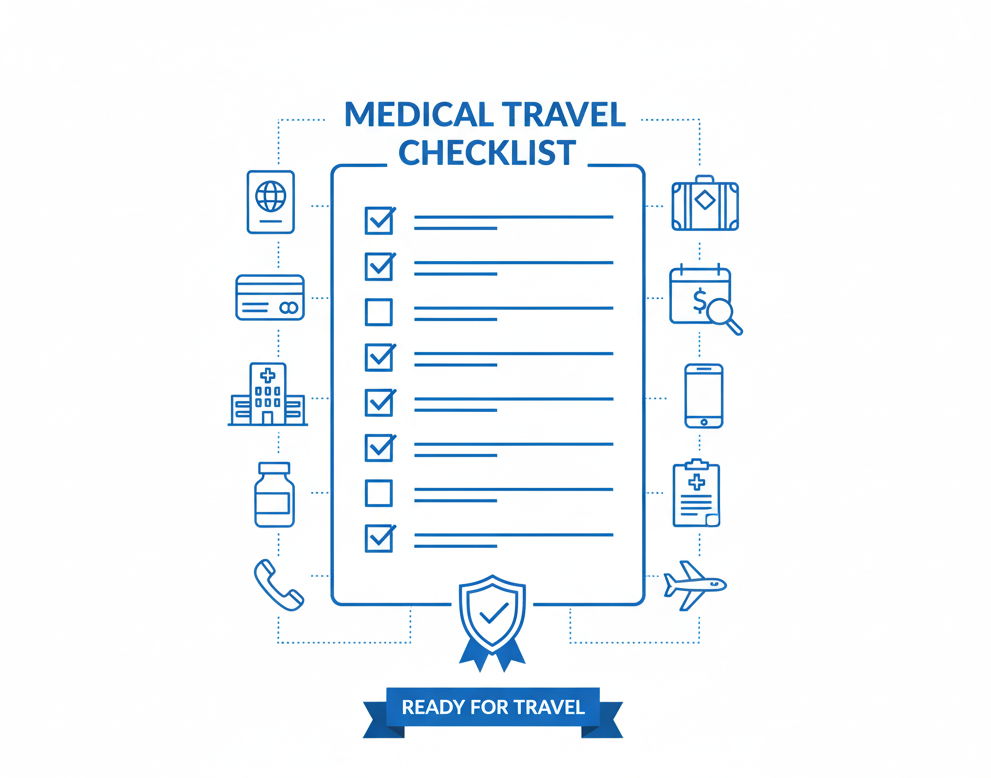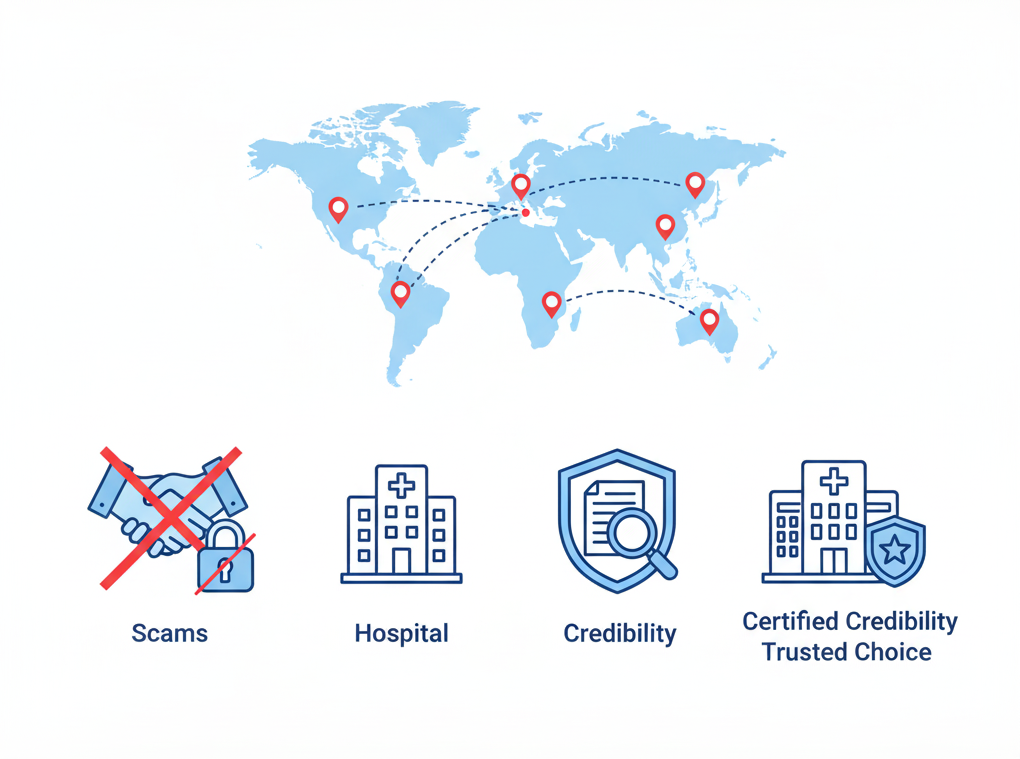
Medical Tourism Checklist: Everything You Need Before You Travel
Medical tourism has emerged as a transformative option for patients worldwide seeking advanced medical treatments at affordable prices. The decision to travel abroad for healthcare requires meticulous preparation to maximize safety, comfort, and successful outcomes. Whether it is a cardiac surgery in India, dental implants in Mexico, or cosmetic procedures in Thailand, proper planning can significantly reduce risks and stress.
This exhaustive checklist covers every critical factor—before, during, and after your medical travel—to help you confidently embark on your healthcare journey in 2025.
1. Understand Your Medical Condition and Treatment Options
-
Get a precise diagnosis: Start with your local healthcare provider for thorough diagnostic evaluations and a confirmed diagnosis.
-
Explore treatment alternatives: Research conventional and advanced treatment options offered abroad. Compare procedures, success rates, and technological capabilities.
-
Assess candidacy: Not all patients are eligible for all procedures abroad due to medical complexity or comorbidities. Obtain professional guidance.
-
Second opinion: Consider international medical consultations or telehealth second opinions to validate your treatment plan.
-
Set realistic expectations: Understand the surgical process, risks, realistic recovery timelines, and possible complications, so you’re well-prepared mentally and physically.
2. Research and Select the Optimal Destination
-
Focus on expertise: Prioritize countries and cities acclaimed for excellence in your specific treatment, such as India for cardiac care, Thailand for cosmetic surgery, or Mexico for dentistry.
-
Hospital accreditation: Verify hospital accreditation such as Joint Commission International (JCI), International Society for Quality in Health Care (ISQua), or country-specific certifications.
-
Travel logistics: Check visa requirements, medical visa availability, flight availability, travel time, and health protocols, including vaccination and COVID-19 related rules.
-
Cultural and language factors: Assess language proficiency of medical staff and cultural comfort to avoid communication barriers.
-
Legal and ethical standards: Review the country’s medical malpractice laws, patient rights, and safety regulations.
3. Choose the Right Hospital and Medical Team
-
Verify credentials: Examine doctors’ certifications, training, years of experience, and reputation through professional and patient reviews.
-
Patient support services: Check if the hospital has dedicated international patient departments offering coordination, language support, accommodation help, and travel assistance.
-
Consultation: Arrange pre-travel video or in-person consultation with your surgeon and medical team to discuss your case, expectations, and clarify doubts.
-
Technology and facilities: Investigate the availability of cutting-edge equipment like robotic surgery systems, AI diagnostics, and advanced imaging, ensuring comprehensive care.
4. Prepare Your Medical Documents and Records
-
Comprehensive medical history: Gather all relevant documents including medical reports, lab results, diagnostic imaging (X-rays, MRI, CT scans), biopsy results, and prior treatment details.
-
Medication records: List current prescriptions, dosages, allergies, and previous adverse drug reactions.
-
Official translations: Arrange certified translations of your documents to the destination country’s official language if needed.
-
Digital and hard copies: Maintain both digital copies on secure devices and physical copies in your carry-on for easy access during travel and hospital visits.
-
Emergency contacts: Compile contact details for your local doctor, relatives, and emergency services.
5. Financial Planning and Insurance Preparations
-
Detailed cost breakdown: Obtain in writing the full cost estimate inclusive of consultations, surgery, anesthesia, hospital stay, medications, post-op care, and follow-up.
-
Payment terms: Clarify payment methods, currency conversion, deposits, refund policies, and possibility of bundled packages.
-
Insurance coverage: Check existing health insurance for out-of-country coverage. If unavailable or limited, purchase travel insurance inclusive of medical evacuation and repatriation.
-
Budget for incidentals: Include travel, accommodation, meals, companion expenses, and contingencies.
-
Currency management: Carry local currency and internationally accepted credit cards. Inform your bank about international travel to avoid payment declines.
6. Plan Your Travel and Accommodation
-
Travel timing: Schedule flights to accommodate required pre-surgery testing and post-surgery recovery time to avoid rush and fatigue.
-
Accommodations: Book lodgings near the hospital with medical hospitality services or recovery-focused resorts.
-
Local transportation: Arrange airport transfers and daily travel options in advance, especially for post-op mobility needs.
-
Travel companions: Opt for a trusted friend or family member to accompany you during your trip for psychological support and logistical help.
7. Pack Smartly for Your Medical Trip
-
Clothing: Pack loose, comfortable attire suited for hospital stays and post-op restrictions.
-
Essentials: Include toiletries, prescription medications (for the entire stay plus some buffer), medical devices (e.g., CPAP machines), and health supplements.
-
Travel health kit: First aid supplies, antiseptic wipes, bandages, pain relievers, and any specialized medical supplies recommended by your doctor.
-
Documentation: Organizer with passport, visa, medical and insurance documents, hospital contacts, emergency numbers.
-
Electronics: Chargers, power banks, communication devices, and apps for health monitoring and translation.
8. Pre-Surgery Preparation and Health Optimization
-
Follow pre-op protocols: Strictly adhere to fasting, medication modifications, and hygiene instructions provided by your medical team.
-
Rest and hydration: Ensure quality sleep and stay well-hydrated days before surgery.
-
Prepare your mental health: Address anxiety or fear through counseling, meditation, or relaxation techniques.
-
Pre-op fitness: If advised, undertake light exercises or breathing techniques to enhance surgical outcomes.
9. Quality and Safety Assurance During Treatment
-
Facility hygiene: Confirm sterilization procedures comply with international standards upon admission.
-
Informed consent: Ensure clear understanding of the procedure, alternative treatments, risks, and benefits; sign comprehensive consent forms.
-
Monitor care: Stay vigilant for signs of infection or medical errors; communicate openly with care providers.
-
Documentation: Obtain a detailed report of diagnosis, treatment, surgery notes, and post-op instructions for future reference.
10. Post-Operative Care and Follow-Up
-
Hospital stay: Follow intensive monitoring, medication, wound care, and physiotherapy under medical supervision.
-
Rehabilitation: Engage fully in prescribed rehabilitation programs to optimize recovery.
-
Telehealth follow-up: Use virtual consultations with your healthcare providers for ongoing care after returning home.
-
Emergency plan: Know local emergency contacts near the hospital and have contingency plans for unexpected complications.
-
Integration with local healthcare: Schedule appointments with your home country doctors for continuity of care and long-term health monitoring.
11. Additional Tips for a Safe Medical Travel Experience
-
Stay informed: Regularly check official government travel advisories and health updates.
-
Cultural respect: Learn basic local customs, healthcare etiquette, and patient rights.
-
Maintain open communication: Keep family and friends updated on your health status and plans.
-
Use reputable agencies: Partner with certified medical tourism facilitators or do in-depth vetting if self-arranging.
-
Have contingency funds: Prepare for unforeseen expenses or extended stays to avoid financial stress.










